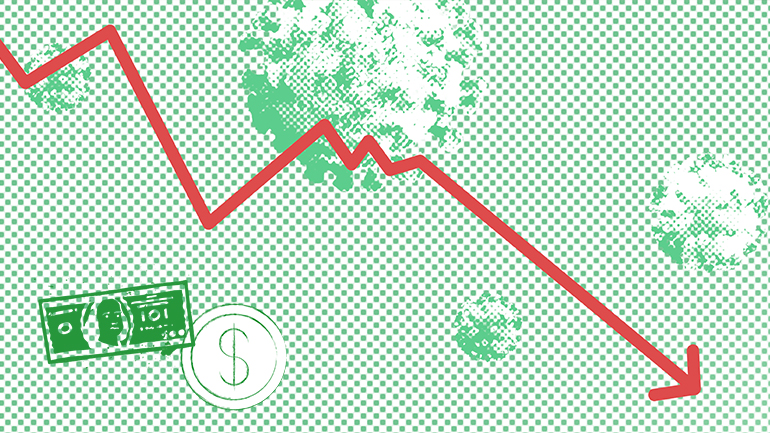Alongside the anguish of families losing loved ones to the COVID-19 pandemic runs a swift and swelling river of financial distress. A decade of job growth was wiped out in a matter of weeks. Retail sales plunged more steeply than ever recorded. Oil prices briefly went negative. The International Monetary Fund estimates that the “Great Lockdown,” while necessary, will shrink the global economy by 3 percent in 2020, a reversal of its previous prediction of 3.3 percent growth. And every time news breaks, the market gyrates.
It’s perfectly understandable that you’d rather bake a cake — or even clean behind the refrigerator — right now than lay an eye on your portfolio. Even worse than ignoring your investments, you might be tempted to liquidate that portfolio and hide the proceeds under the floorboards, Great Depression style.
But, turning a blind eye or panic selling would both be a big mistake right now. Although the timeline is uncertain, the COVID recession will end eventually, and when it does, you want to be positioned to take advantage of economic growth once again.
“The rebound certainly isn’t yet at hand, but I am confident we will get there eventually and that it may be stronger than many expect,” wrote Lisa Shalett, Morgan Stanley’s Chief Investment Officer, wealth management, in a recent commentary.
But what to do in the meantime? Here are tips from top wealth managers about how to minimize harm and position your portfolio as well as possible during the COVID recession.

1. Consult an advisor
If you’re not already working with a financial adviser, now is the time start, for a host of reasons. A good adviser can dissuade you from knee jerk reactions to volatility. They can also help you assess whether your portfolio is appropriate for the strange new landscape we find ourselves in.
“Re-evaluate the risk in your portfolio depending on your time horizon,” recommends Susan Oleari, Chicago Regional President for BMO Private Bank. That’s something a good financial adviser can help you do.
They could even help you find some bright spots.
“There are lots of silver linings to be had in the midst of downturns, including tax loss harvesting, rebalancing or even adding new money if the investment will be long term in nature,” says Steve Branton, an adviser with planning firm Private Ocean.
2. Resist attempting to time the market
If there is one thing that’s certain right now, it’s uncertainty. Timing the market is a fool’s errand under normal conditions, and so much more so in our current unprecedented situation.
But that doesn’t mean you can’t sell anything right now. In fact, if you were planning to sell assets in future months, it might be wise to consider doing it now instead.
“Ensure you have cash to cover expenses, knowing this could continue for some time,” Oleari advises.
3. Weatherproof your portfolio
Another legitimate reason to sell right now is to eliminate investments that look too weak to survive the ongoing storm.
“This kind of market volatility represents a great time for investors to upgrade the quality of their investment portfolio,” says James Demmert, founder and managing partner of Main Street Research. Companies with too much debt and those in industries that may have trouble rebounding in the post-COVID economy should be cut loose, he advises.
Again, this is where a professional can help you out.
“The best course of action is to meet with your financial advisor to understand the underlying forces impacting each asset class. Some investments may no longer be sound. Others may just be out of favor,” says Bruce Raabe, CEO of HaveCoffeeWithBruce.com.
4. Look for long-term investments
“Given how grim the near-term outlook is for the economy and corporate profits, it may surprise you to know that I believe some of the best investment opportunities in this generation are being created right now,” Shalett, of Morgan Stanley, writes.
The opportunities catching Shalett’s eye are asset classes that have already taken a beating, such as commodities (the raw materials used to build other products). She’s also eyeing high-yield bonds.
When looking at equities, Demmert recommends envisioning what kind of company is likely to thrive in the post-COVID world, which he imagines will be markedly different from the world we left behind when we all retreated into our houses.
“A modern C-19 recovery portfolio should be invested in companies that have very little debt and provide a service or product that will be in high demand. We would suggest technology companies that increase efficiency, telecommunication companies such as wireless and Internet related, consumer discretionary companies like Amazon, healthcare such as biotech and medical devices, consumer staples like food, beverages and goods we use every day, and finance that is part of our lives, such as big solid banks and companies like Visa and Mastercard,” Demmert says.
Any investments you add now should be for the long term.
“There could be considerable downside yet to come,” Oleari warns. “Invest cash in high-quality, brand names stocks that you know will survive on the other side.”
The long-term view doesn’t exclude solid companies whose impact is shining right at this strange moment. For instance, with gyms closed and more people than ever working out from home, the stationary bike and streaming class service Peloton is rated as a “buy” or “strong buy” by the majority of analysts.
And although lockdowns will end eventually, that may not end the benefit for companies like Peloton, Demmert says.
“It appears to us that people will demonstrate longer term behavioral changes as a result of Covid-19, and spending more time at home will be part of this change of behavior,” Demmert says. Benefiting from that change, beyond Peloton, will be companies involved in video streaming, online entertainment, gaming, telecommunications and technology, Demmert says.
How to help:
While you may be evaluating your investment portfolio, there are many facing unspeakable hardships right now. Find a list of nonprofits that need your support on our Better List.
More from Better:
- Mental Health Check: ‘How Are You?’ Becomes a Loaded Question in the Time of COVID
- April is Poetry Month — Here’s Why It’s Important to Get Your Kids Involved
- Love and Longing During COVID-19: Coping With the Emotional Toll of Social Distancing
 Carrie Kirby spends a lot of time asking people about something they think about but rarely talk about: money. Her work on personal finance, business and technology has appeared in San Francisco Magazine, The San Francisco Chronicle, Wise Bread and more publications. She lives on an island (Alameda) with her husband and three kids, and blogs about family travel and mileage rewards at The Miles Mom.
Carrie Kirby spends a lot of time asking people about something they think about but rarely talk about: money. Her work on personal finance, business and technology has appeared in San Francisco Magazine, The San Francisco Chronicle, Wise Bread and more publications. She lives on an island (Alameda) with her husband and three kids, and blogs about family travel and mileage rewards at The Miles Mom.

